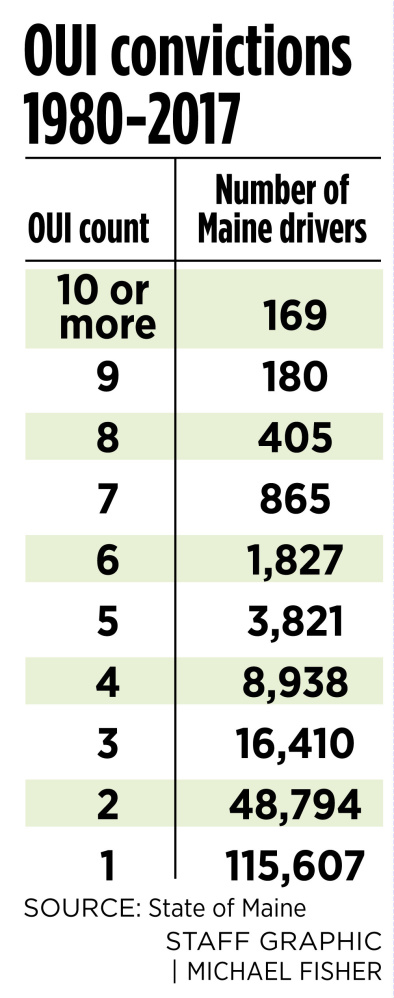When Mark Burson got behind the wheel of his pickup truck last August and headed north on Interstate 295, he had already been convicted of driving under the influence of alcohol eight times and was driving with a suspended license.
But that didn’t stop him. What did get him off the road, and put him behind bars, was ramming into the rear of a Topsham police cruiser as he exited the highway.
Burson, 56, of Limestone, isn’t an anomaly.
About 350 people have been convicted of driving under the influence at least nine times in Maine. More than 16,000 drivers have had four or more drunken driving convictions since 1980, and one driver has been convicted of OUI 18 times, an analysis by the Maine Sunday Telegram found. State officials refused to identify that driver, citing privacy laws governing driving records.
State officials believe Maine has tough OUI laws on the books, but they have failed to keep many convicted offenders from getting back behind the wheel after drinking, said Secretary of State Matt Dunlap, who oversees the state’s motor vehicle bureau.
“It doesn’t matter what penalty you throw at them,” Dunlap said. “They’re not going to get the hint – it’s a chemical dependency issue.”
Dunlap favors treatment for repeat offenders and opposes some stricter penalties that have been suggested, such as permanently revoking the driver’s licenses of repeat OUI offenders. New York is the only state with such a law on the books.
Permanent license revocation makes sense to Melodie Brennan, whose husband was killed and her son seriously injured when they were run over by a four-time convicted drunken driver in 2013. Her husband, Jamerico Elliott, was riding a bike on the sidewalk with their young son in a child seat on the back. The son, Lavarice, has had to undergo multiple surgeries for injuries to his leg and head. Brennan, who was riding another bike, was also struck and injured.
“They really should lose it,” she said of repeat offenders. “I was so mad at the fact that he was still driving. Why was he not in jail?”
The driver, David Labonte of Biddeford, had a blood-alcohol level of twice the legal limit at the time of the crash. He pleaded guilty to manslaughter and was sentenced to 20 years in prison with all but 10 years suspended.
Labonte’s driver’s license will be suspended for 10 years after his release from prison, but he can petition to have it restored after that.
“It took me a year to start walking again, and my son still has to have surgery,” Brennan said. Lavarice last had surgery to remove pins from his leg, she said, and will next need to have a stent in his head replaced.
Brennan said her life has been hard since the crash. Labonte had no insurance, she said, and she was evicted from the Biddeford apartment where she lived and has moved into temporary housing in Saco with her son, now 5.
MORE THAN 80,000 HAVE MULTIPLE OUIS
Despite tragedies like Brennan’s, and nearly three years after a new Maine law took effect that was intended to make it easier to hit drunken drivers with stiffer penalties, the number of repeat offenders remains high. More than 80,000 drivers have multiple OUI convictions in Maine.
First-time OUI offenders face fines and a license suspension in Maine. A total of 115,607 drivers have been convicted only once of driving drunk, according to state records on OUI convictions, which date back to 1980 and include out-of-state drivers who offended in Maine.
“The vast majority of people who go through that mill, go through it, endure it and say, ‘I’m not going to do that again,’ ” Dunlap said.
First-time offenders in cases that don’t involve a crash or injury face a minimum five-month license suspension and a fine of $500. Hiring a lawyer adds to the cost and penalties rise for multiple offenses; for instance, the minimum penalty for a fourth conviction is an eight-year license suspension, six months and 30 days in jail and a fine of $2,500.
Maine changed its laws in 2014 to allow prosecutors to consider all prior felony OUI convictions, no matter how long ago they occurred, in determining how to charge offenders and what penalties to seek. Previously, only OUIs during the most recent 10-year period were considered. The law also requires that a third OUI be a felony, meaning the offender can be sent to jail for more than a year.
Burson had a blood-alcohol level of 0.35, more than four times the state’s legal limit of 0.08, when he rammed the back of the police cruiser in Topsham. He was sentenced last week to seven years in prison, three years of probation and a 10-year license suspension, but he will likely be allowed to get back behind the wheel eventually.
Maine, like the vast majority of states, does not permanently revoke driver’s licenses, no matter how many OUI convictions a driver has on his or her record.
The crash occurred last August on the I-295 off-ramp to Topsham. Lucas Shirland, the Topsham officer whose cruiser was hit, suffered a minor neck injury and there was minor damage to the cruiser.
Shirland had been on I-295 after receiving a report of an erratic driver. After parking along the highway for about 20 minutes and seeing no one driving erratically, he was driving off the highway to go back on patrol when Burson ran into him.
“I couldn’t find him, but ultimately, he found me,” Shirland said.
Shirland said he, like many police officers, recognizes there’s only so much police and the courts can do to stop repeat OUI offenders from getting back behind the wheel.
“You can’t stop someone from driving unless they’re in jail,” Shirland said. While behind bars, he said, “hopefully he (Burson) gets the help he needs and rehab and hopefully he can tackle the addiction that caused this.”

Topsham Police Officer Lucas Shirland, above, was responding to a report of an erratic driver on Interstate 295 last summer when his police cruiser was rear-ended by a vehicle driven by Mark Burson, 56, of Limestone. Burson, right, had eight prior convictions for operating under the influence and had been driving with a suspended license.
WOULD REVOKING LICENSES BE EFFECTIVE?
Stephen McCausland, spokesman for the Maine Department of Public Safety, agrees that suspending the licenses of habitual drunken drivers has a limited effect.
Unless officers recognize the driver and know that his or her license is suspended, they’re not going to stop a car unless the driver does something wrong, such as running a stop sign or driving with a broken headlight, McCausland said. Only when the driver’s license is checked after a stop will an officer find out whether it has been suspended, McCausland said.
Dunlap said he doesn’t think lifetime license suspensions would necessarily be any more effective than the penalties already in place.
He said laws have been stiffened and cultural attitudes toward drinking and driving have changed in the past 40 or 50 years, but the reality is that people still drive drunk, although it is perhaps not as common as in the past.
He said repeat offenders are usually alcoholics and they need help as much as they need to have their licenses suspended.
“Their problem isn’t driving, their problem is drinking,” Dunlap said.
MADD ADVOCATES FOR ‘SMART JUSTICE’
A top official with Mothers Against Drunk Driving, an advocacy group for victims of drunken driving, said the organization’s focus has shifted in recent years away from seeking license suspensions to cut down on drunken driving.
The organization now promotes other approaches, such as requiring offenders to use ignition interlock systems – Breathalyzers connected to auto ignition systems that prevent a car from being started if alcohol is detected on the driver’s breath, according to Frank Harris, director of state government affairs for the group. Stiff penalties are on the books in Maine and other states for those who try to circumvent the system.
The devices cost about $100 to install and are leased for $50 to $100 a month. In Maine, interlock systems are voluntary – convicted OUI offenders can request permission to drive before their driver’s license has been reinstated if an interlock system is installed in the car. Such requests are generally granted only to first-time offenders.
In Maine last year, Harris said, interlock systems stopped about 1,500 attempts to drive when legally drunk.
In other states, he said, judges can order an offender to have an interlock system installed, and they have proved effective when used for long periods of time.
“License suspension alone is nothing more than a hope for the best outcome,” Harris said, but requiring use of an interlock device “is smart justice.”
Edward D. Murphy can be contacted at 791-6465 or at:
emurphy@pressherald.com
Send questions/comments to the editors.





Comments are no longer available on this story